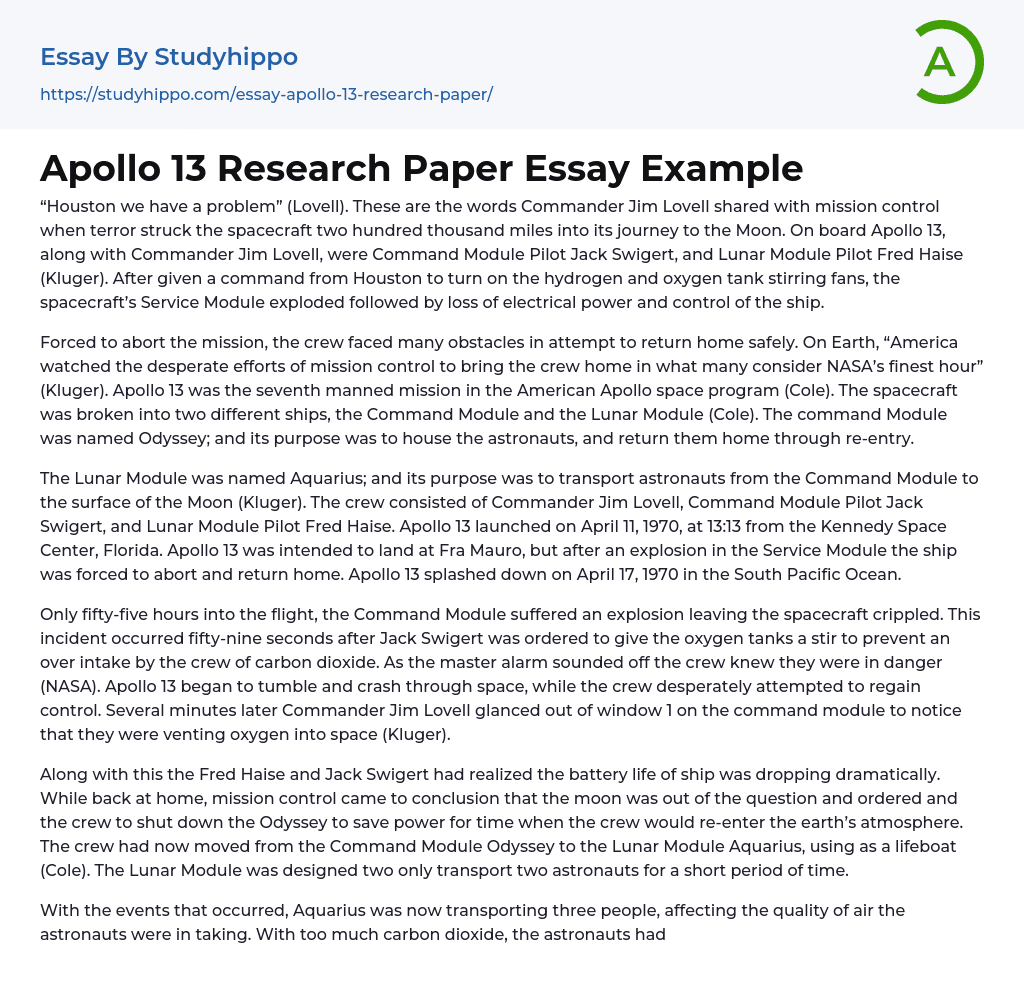During the Apollo 13 mission, Commander Jim Lovell became famous for saying "Houston we have a problem" when they were approximately two hundred thousand miles into their journey to the Moon. Commander Lovell was accompanied by Command Module Pilot Jack Swigert and Lunar Module Pilot Fred Haise onboard. As per Houston's instructions, they activated the hydrogen and oxygen tank stirring fans, but unfortunately, an explosion happened in the spacecraft's Service Module. This resulted in a loss of electrical power and control over the vessel.
Despite being forced to abort the mission, the crew encountered numerous obstacles in their attempt to safely return home. On Earth, NASA's desperate efforts to bring the crew home were watched by America, marking what is considered as NASA's greatest achievement (Kluger). Apollo 13 was the seventh manned mission in A
...merica's Apollo space program (Cole). The spacecraft consisted of two separate ships, namely the Command Module and the Lunar Module (Cole). The Command Module, named Odyssey, served as the astronauts' living quarters and facilitated their return through re-entry.
The Aquarius Lunar Module was created to transport astronauts from the Command Module to the Moon's surface (Kluger). The crew consisted of Commander Jim Lovell, Command Module Pilot Jack Swigert, and Lunar Module Pilot Fred Haise. On April 11, 1970 at 13:13, Apollo 13 took off from Florida's Kennedy Space Center. However, the mission had to be aborted due to an explosion in the Service Module and the spacecraft had to return home instead of reaching its intended destination of Fra Mauro. Ultimately, on April 17, 1970, Apollo 13 successfully landed in the South Pacific Ocean.
Only 55
hours into the flight, an explosion crippled the Command Module, which occurred 59 seconds after Jack Swigert was instructed to stir the oxygen tanks. When the master alarm went off, the crew realized they were in danger (NASA). Apollo 13 started tumbling and crashing through space as the crew desperately tried to regain control. A few minutes later, Commander Jim Lovell saw that oxygen was venting into space through window 1 on the command module (Kluger).
The ship's battery was depleting quickly, leading Fred Haise and Jack Swigert to acknowledge the problem. In addition, mission control decided that going to the moon was no longer feasible and instructed the crew to power down the Odyssey in order to save energy for re-entry into Earth's atmosphere. Consequently, the crew transitioned from the Command Module Odyssey to the Lunar Module Aquarius, which was designed for temporary use and could only accommodate two astronauts (Cole).
Due to the events that occurred, Aquarius was now transporting three individuals, which affected the air quality that the astronauts were breathing in. To combat the excess carbon dioxide, the astronauts had to improvise and create a filter using items found on board Apollo 13 (NASA). Fortunately, this filter successfully prevented any further increases in carbon dioxide. As the crew approached closer to Earth, they jettisoned the service module. This action involved releasing both the Lunar and Service Module, leaving them in the Odyssey as they prepared to return home (Kluger). During the re-entry process, the spacecraft experienced a blackout period.
During this period of time, all communication via radio with mission control was lost (Cole). Apollo 13 managed to
regain the signal for a duration of thirty-three seconds longer than the usual four minutes, and each crew member survived. The incidents that took place aboard Apollo 13 resulted in substantial modifications to the space program. A group was appointed to thoroughly investigate the reason behind the accident that led to the crew's mission being aborted (Kluger). It was concluded that a damaged coil was responsible for the explosion. This flaw had been identified two years before the spacecraft even departed from Earth. NASA devised an emergency plan for circumstances like what Apollo 13 endured.
According to NASA, the review board ensured the safe return of Apollo missions fourteen to eighteen homes. Crewmembers Jim Lovell, Jack Swigert, and Fred Haise from Apollo 13 taught valuable lessons to numerous missions that followed. Despite its challenges, the Apollo 13 mission left behind several legacies that allowed future missions to avoid similar mistakes. Before Apollo 13, America's main goal in reaching the moon was to surpass Russia; however, after achieving this goal successfully, the nation no longer felt compelled to go back.
After witnessing the ordeal of Apollo 13, people's perception of flying to the moon changed. It no longer seemed routine or as unexciting as a trip to Pittsburgh (Cole). Despite not reaching their intended destination, the crew's safe return made the mission famously known as the successful failure. Subsequently, astronauts successfully landed on and returned from the moon without any complications. Countless individuals collaborated and faced diverse challenges to ensure the Apollo 13 crew's safe return. Lovell poignantly expressed his curiosity about when we will go back to the moon and who will embark
on that journey (Lovell).
- Achilles essays
- Apollo essays
- Gilgamesh essays
- Hercules essays
- Iliad essays
- Myths essays
- Odysseus essays
- Oedipus essays
- Trojan War essays
- Zeus essays
- Accident essays
- Awareness essays
- Benefits of Volunteering essays
- Challenges essays
- Childhood Memories essays
- Decision essays
- Driving essays
- Event essays
- Excellence essays
- Expectations essays
- Failure essays
- Farewell essays
- Flight essays
- Gift essays
- Growing Up essays
- Ignorance essays
- Improve essays
- Incident essays
- Knowledge essays
- Luck essays
- Memories essays
- Mistake essays
- Obstacles essays
- Overcoming Challenges essays
- Party essays
- Peace Corps essays
- Personal Experience essays
- Problems essays
- Sacrifices essays
- Struggle essays
- Success essays
- Trust essays
- Vacation essays
- Visit essays
- Volunteering essays
- Agriculture essays
- Albert einstein essays
- Animals essays
- Archaeology essays
- Bear essays




